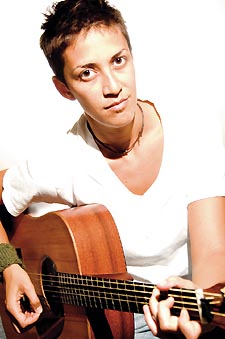Break It Down
With her second album ready to release, D.C.'s Mara Levi is getting ready to hit the road on tour
It’s a sunny 80 degrees in Puerto Vallarta, where Mara Levi is celebrating her 30th birthday with family and working on her tan. She’s also talking, by phone, about her second solo CD, What Are You?
Coming after her stint with her band, Kid Sampson, and her 2003 solo debut, Life’s A Ball, Levi says she’s trying to pare down to her essentials — no easy task for a woman whose influences range from Johannes Brahms to Aimee Mann.
Levi also embodies a sort of whirlwind-with-a-smile dynamic, making it more difficult to pin her down stylistically. That dynamic may also lead to a dressing-down from traffic police.

”Don’t tell my close friends and family,” she says, ”but I do a lot of writing while I’m sitting in the car in traffic or even on the open road. I occasionally write things down, but usually I just try to sing them into my voicemail.”
On March 1, Levi will offer her local fans and friends the official kick-off concert for What Are You? at her regular venue, Phase 1 on Capitol Hill. For anyone holding a copy of this Mara Levi interview, Levi says she’ll be happy to sign the cover. Actually, she promises to autograph whatever her fans may throw her way. ”Skin, paper … what is a CD made of?”
Her message, however, is more than her moniker.
”What would I say to my fans? To my D.C. fans, especially, I would say ‘Thank you,’ either for having been at my CD-release show, or just for supporting me and making me feel so welcome here.”
METRO WEEKLY: So, what are you?
MARA LEVI: The reason I titled the CD as such was that I had been answering that question over and over for different people: critics, press people, fans and everybody. Generally, it was a similar answer [to each], but I sort of had to tailor it and cut out important bits. So the point of the title is that I am more than I can tell you in a few words.
MW: When people asked the question, were they indirectly asking if you are gay?
LEVI: It depends. It’s everything from when I was a kid being asked if I was a boy or a girl to, more recently, ”What type of music do you play?” or ”Are you a gay musician or are you more than that?” or ”Do you play pop music or folk music?”
It really depends on who’s asking the question. In any situation, the answer is slightly different, and never quite as black and white as people might like it to be. I think that’s true of everyone. Maybe some people are a little bit gay or a little bit boy or a little bit girl. There’s so much gray area that totally gets pushed aside, because it’s so much easier to stereotype and put people into little boxes.
I have in the past defined myself as a ”smart pop musician.” I go on to define that as music that is similar to pop music, in that it’s catchy and kind of accessible, but it’s a little bit different from pop music, in that it’s a lot more complex and has a lot more layers of meaning and hopefully is a little bit smarter than your average pop song.
MW: I’m guessing you’re more of an optimist than a cynic.
LEVI: I don’t know, it depends on the day I sing.
MW: Well, you made What Are You? the title of the CD. Obviously, it’s not so offensive that you can’t stand to see it in print. You’ve embraced it.
LEVI: Oh, no. I think it’s also as much as it’s self-deferential: Well, what are you? People keep asking me to define myself and maybe I’m just turning it around a little and asking them to think about what they are. So who knows? I’m certainly an optimist and I’m certainly fine talking about what I am and who I am and how I got to be this way. It’s just that I don’t like to boil it down into sound bites if I don’t have to.
MW: In the Mara Levi merchandise line, there are these ”Homo” stickers. Why?
LEVI: It’s something I think goes along with the Homo Song a little bit: ”Your daughter is a big homo, and she’s lying next to me.”
I don’t have one on my car, but I think it’s funny. I have the rainbow sticker, which is a little bit safer to drive with in Texas. I don’t mean to stereotype Texas, because all Texas is not the same. I’m trying to stay away from stereotypes as much as possible, but there are places where I get nervous and so I have my rainbow sticker and that’s my statement. As much as people feel safe, I think it’s great to push that boundary a little bit and to put it out there in a little bit more obvious and aggressive terms.
MW: Did a design friend of yours make that?
LEVI: I did all the stuff on that [Web site]. I don’t consider myself much of an artist. The homo stickers are just fun, but then there’s like two girls in bed — kind of a ”your daughter is a homo” T-shirt. I drew that all by myself and scanned it in and all of that. The one that says ”Mara Levi gives high fives,” that’s my hand. I think what I did was photocopy my hand — don’t tell my boss.
MW: Are you catching live music in Mexico? Any chance some Latin influence might creep into your next CD?
LEVI: There are a ton of musicians that come into the restaurants and play music for people sitting at the tables. They’ll come to your table and ask if you want a song. You give them tips and they play songs. So there’s this trio that we’ve seen at a couple of different restaurants: two guitars and a big upright bass that this poor guy carries around all night. They sing in this great three-part harmony and do all sorts of stuff. I’ve definitely been taking notes.
MW: When I listen to you I can’t help but hear something that reminds me of Joni Mitchell.
LEVI: People have said that, absolutely. I came to Joni Mitchell’s music sort of later in life, like 10 years ago. I think that my voice sounds a lot like hers and maybe my writing style, like my chord changes. She definitely uses more complex chord changes and wanders in directions you wouldn’t expect, which is definitely something I like and I try to do. I don’t often try to emulate her but it may happen anyway.
MW: How did your interest in music evolve?
LEVI: I started playing piano when I was 4, and played that all the way through high school. Then I started playing trumpet when I was 10, when everybody sort of picked up a band instrument. I kept playing that all the way through college, generally classical music. In high school, I also started playing in the jazz band and ended up feeling pretty confident about that.
I actually didn’t do any singing until college. I joined the choir there and continued playing in a jazz ensemble and some funk bands, playing on the trumpet. That was a lot of fun.
College is when I started playing rock and roll. I picked up the bass to play with my friend, who was a guitar player and songwriter. That’s when I really started writing music and paying attention to what other people were writing and playing. Before then, my friends would listen to Nirvana and all that stuff and be so excited about it. I would sort of listen, but I never really connected with it, I guess. I really connected with classical music and the folk music I grew up on, which is probably where Joni Mitchell comes in.
 Levi |
MW: Did you grow up with folk music because your parents liked it, or is it something you were drawn to?
LEVI: It’s what my parents were listening to: Peter Paul and Mary, Pete Seeger, Arlo Guthrie, Joan Baez and all that stuff.
Now when I listen to music, I listen very intently and try to pick up what’s going on. I really can’t just listen, because it’s distracting to me. It’s not generally a pleasant experience for me to listen to music while I’m doing something else, because I’ll totally get pulled out of what I’m doing. My friends will tell you that I have a tendency to get sidetracked no matter what I’m doing.
MW: Your parents will certainly have their bias, but do they rock out when they hear you playing because you remind them of what they’ve liked for years?
LEVI: I don’t know. I would have to ask them.
MW: Do they come to your shows?
LEVI: Yes, they do, and they seem to like it. They seem to like the music I write. I feel like my music…is an offshoot of the things I listened to as a kid. To the degree that they’re comfortable with offshoots and changes to that type of music, I think that they must love it. And they are biased, definitely.
MW: Do you play often at Phase 1?
LEVI: I do. Phase 1 has been great to me. I approached them about a year ago and said, ”Hey, I’m a member of this organization called ‘Outmusic’ and they have an open mike once a month in various cities and I’d like to start one here in D.C. Would you guys like to host it?”
From that, we were able to start what has now become a weekly live-music series at Phase 1. I host the open mike — I think it’s the second Thursday of every month — and then I play my own stuff the fourth Thursday of every month. I usually invite someone I know who’s touring to come play with me, or someone local. The other two Thursdays, I just book whoever wants to come play. It’s been a great way to get to know the gay music community. Certainly there have been non-gay people who have played there and they’ve been equally welcomed. That’s been really fun and a great opportunity for me to connect with those people and to get to play for a pretty supportive crowd on a regular basis.
MW: I’ve heard the new CD, but I’ve never heard you live. How does your live sound differ from your recorded sound?
LEVI: I put a full band on my first CD, because I just loved having a full band. But I do not have a full [live] band, so one of the reasons I did [What Are You?] the way I did is that I wanted to see a more accurate reflection of what my live sound is.
I think that the CD is a pretty accurate reflection of how I sound. I hope I captured some of the energy I have onstage. It tends to be a pretty fun, energetic show and I do a lot of talking about whatever I’m feeling compelled to talk about.
I tried to keep it as restrained and as realistic as possible, so I didn’t put anything on the CD that I couldn’t do myself. I played all the instruments and I did all the vocals.
I think there are like six vocals on one song. As much as it’s not an accurate reflection of my sound in that way, it is an accurate reflection of my personality.
MW: Of all the instruments you play, how many are there that you are comfortable with?
LEVI: I guess four, plus voice, that I’m really comfortable with: piano, trumpet, bass, guitar and voice. The sounds on [What Are You?] that don’t sound like any of those are just a keyboard. I have a little Casio keyboard that my parents gave me as a birthday present when I turned 11.
MW: You’re using the same keyboard?
LEVI: Same keyboard. I used it for my thesis in college. I just held onto it and I use it to teach voice lessons now.
MW: Do you have a very devoted following, groupies? Do girls throw panties onstage?
LEVI: I’ve never had panties thrown at me. I would say I don’t have groupies, in the sense that I don’t think that anybody is afraid to come up and talk to me. I definitely have some very devoted fans who make sure that they catch my shows when I’m in their towns, and have lots to say to me and want me to listen to their music. In that sense, I have some very devoted fans and also some very good friends who really help to populate my shows with their friends and themselves and all the rest.
MW: What did Life’s A Ball teach you about promoting a CD?
LEVI: One of the things I learned was that I wasn’t really promoting in any concerted way. I just sort of finished it and started taking it to shows. Since then, I’ve learned that press releases are really a cool thing. I released Life’s A Ball in 2003 and that was my first time doing anything alone. I had had a band before that, but we didn’t know what we were doing either.
I’ve had [What Are You?] in my possession already for a month. It’s just about to be for sale. That’s given me time to do the advance press and have the release be sort of a big deal. Hopefully that will help with sales. It certainly has helped with booking the tour because people are excited about having a CD-release kind of event. That’s the kind of stuff I’ve learned. As for how to best organize my time, I don’t know that I’ll ever learn that effectively.
MW: When you’re doing one of your long tour drives, is there a chance you’ll stick Life’s A Ball in the CD player? Do you still enjoy it?
LEVI: I’ve done that a couple of times because of all the people on there: all my friends and my sister and all sorts of fun people. It’s fun for me to listen to that.
More frequently, I pop in the old CD from my band, Kid Sampson, which I think is a great CD. We worked so hard on it and really did do it all ourselves. I listen to that and think, ”Oh, my God, I was 22 years old when I did this and I’m still really proud of it.” And I hope to feel that way about What Are You? as well.
MW: When you first heard the finished product, what was your first reaction? Glee?
LEVI: It certainly is a huge satisfaction to have it finished. There weren’t very many surprises in terms of how it sounds. I recorded it all by myself in my little studio in D.C. — when I say ”studio” I mean my studio apartment, I should clarify. Then I took it to a recording studio in Massachusetts, which is where I did my last CD. I took it to the Slaughterhouse [Recording Studios] and Mark Alan Miller, whom I know well and trust with anything, made a huge difference in how it sounds. He added the exact right effects and did all the mixing. Leaving his studio I felt like I could be confident that this was going to be a professional sounding, excellent product. I didn’t have that confidence going in. I knew that it was good music going in but I didn’t know that it was going to be a good CD.
And then I actually sent the CD away to get mastered. So that’s the first time it was ever out of my hands. When it came back from being mastered, I was very pleased with the difference in sound. Just having the final product in your hands after all that is more just relief than glee.
MW: You have strong musical ties to Boston, went to school at Amherst College and grew up in Ohio. How did you end up in D.C?
LEVI: I met my girlfriend at Amherst. We both went to school there. She went there about 5 years after I did, but we met when I was living in Northampton [Mass., near Amherst]. She graduated from school and didn’t want to stay in that city. As a touring musician, it didn’t matter so much to me where I was posted so I sort of let her pick and this is where we ended up. Now she’s in law school so I’m going to be here for a few more years. It is kind of a big city, but not so big as New York, and kind of close to her parents in Virginia. It’s just a nice place to be.
MW: How have you taken to Washington?
LEVI: One of the reasons that D.C. was okay with me is that my uncle lives here, I’d been [to D.C.] a number of times and it’s a great city. I love it.
I’ve lived in Northampton and New York, both of which are supposed to have fantastic music scenes, but I love D.C. I really love the scene here. I think that in no other city have I found other musicians to be so supportive of one another and so interested in listening to one another. I’ve found booking people here who actually care about who is playing on each bill, who try to put people together who are similar. Believe it or not, that’s not all that common. Once my rock-and-roll band shared the stage with a girl lip-sync dance group in New York. You never know what you’re going to get in some of these cities. I’ve found D.C. a great place to play music.
MW: Are there other cities on the horizon?
LEVI: I don’t think that either of us is feeling pulled to leave. I don’t want to speak for her, but I think that we’re both having a great time and we’re both willing to go wherever life takes us. If that means we stay in D.C. for a while, I think that would be just fine for us. We’ve also met some really cool people, we have some good friends, and there’s a lot of fun stuff to do.
Advertisement
|
MW: Going back to What Are You?, this is a chance to say, ”If this is your taste, this is a CD you’ll like.”
LEVI: One of the reasons that the title is fitting is that the CD itself encompasses a lot of different genres. It fits into folk music, because of the acoustic guitar. It fits into rock and roll or pop music with the jumpy, catchy songs that I write. Some stuff is bluegrass. A lot of the stuff is influenced by classical theory — one song in particular is lifted directly from ”Brahms’s Requiem.” Somebody who doesn’t necessarily like folk music might still like my music because it’s not just a specific style, it’s also the way the music is written.
The way it’s performed is certainly a part of it, but the way that it’s written influences how you perceive it as a listener. And the way that it’s written, in terms of both the chord changes and the lyrics, I think is a little bit more complex than folk or pop. For that reason, I think people who like classical music, people who like jazz, will also enjoy it.
I’m not trying to appeal to every single person and I sound sort of like a politician doing that. [Laughs.]
MW: It’s a good city for that.
LEVI: That’s not my aim. The point of letting all the songs that are different from one another be on the CD is because they are all sort of different parts of me. Sometimes you’re in the mood for a fast song, sometimes you’re in the mood for the ”Homo Song.” Everybody has a different sense of humor in a different moment and a different sensibility in a different moment. My goal in life is no one song for every mood. The CD sort of reflects a lot of those different moods.
I sort of intentionally let myself go wherever I wanted to go with the CD, which means that it’s not all that consistent. That’s what makes it more human and makes it more reflective of a complex personality — my own or yours or anyone else’s. Hopefully, there’s something for everybody.
Mara Levi will appear tonight, March 1, at Phase 1, 525 8th St. SE, at 9 p.m. There is no cover charge and the club is 21+. Her new album, What Are You? will be available at the show and, starting Tuesday, March 6, through www.maralevi.com and at the iTunes music store.
Support Metro Weekly’s Journalism
These are challenging times for news organizations. And yet it’s crucial we stay active and provide vital resources and information to both our local readers and the world. So won’t you please take a moment and consider supporting Metro Weekly with a membership? For as little as $5 a month, you can help ensure Metro Weekly magazine and MetroWeekly.com remain free, viable resources as we provide the best, most diverse, culturally-resonant LGBTQ coverage in both the D.C. region and around the world. Memberships come with exclusive perks and discounts, your own personal digital delivery of each week’s magazine (and an archive), access to our Member's Lounge when it launches this fall, and exclusive members-only items like Metro Weekly Membership Mugs and Tote Bags! Check out all our membership levels here and please join us today!


























